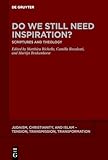Do We Still Need Inspiration? : Scriptures and Theology / ed. by Matthieu Richelle, Martijn Beukenhorst, Camilla Recalcati.
Material type: TextSeries: Judaism, Christianity, and Islam – Tension, Transmission, Transformation ; 24Publisher: Berlin ; Boston : De Gruyter, [2023]Copyright date: ©2024Description: 1 online resource (VI, 207 p.)Content type:
TextSeries: Judaism, Christianity, and Islam – Tension, Transmission, Transformation ; 24Publisher: Berlin ; Boston : De Gruyter, [2023]Copyright date: ©2024Description: 1 online resource (VI, 207 p.)Content type: - 9783111293271
- 9783111297590
- 9783111296586
- 230
- online - DeGruyter
- Issued also in print.
| Item type | Current library | Call number | URL | Status | Notes | Barcode | |
|---|---|---|---|---|---|---|---|
 eBook
eBook
|
Biblioteca "Angelicum" Pont. Univ. S.Tommaso d'Aquino Nuvola online | online - DeGruyter (Browse shelf(Opens below)) | Online access | Not for loan (Accesso limitato) | Accesso per gli utenti autorizzati / Access for authorized users | (dgr)9783111296586 |
Frontmatter -- Contents -- Introduction -- Part I: Inspired Writing? -- Theology within Textual Plurality? -- 1 Biblical Plurality: An Ongoing Conversation Embodied in Scriptures -- 2 Theologies in the Hebrew Bible and Theology of the Hebrew Bible: Some Methodological Considerations and Case Studies -- How to Deal with Textual Fluidity? -- 3 Textual Fluidity as a Challenge to Inspiration? A Biblical Scholar’s Point of View -- 4 Textual Fluidity as a Challenge to Inspiration? A Systematic Theologian’s Point of View -- Part II: Inspired Reading? -- Active Participation in Revelation? -- 5 Revelation’s Activating: The Verbal as the Expression of the Personal Impression -- 6 Reception as Revelation: Correlational Theology in Jewish Tradition and Scripture -- Reception as Revelation? -- 7 New Testament Inspiration and Apocryphal Subtext: The Case of the Epistle of Jude -- 8 Qur’ānic Inspiration: A Triple Rupture? Remarks on the Qur’ānic Process of Revelation -- 9 The Respiration of Scripture – Can there be Inspiration without Expiration? -- List of Abbreviations -- List of Contributors -- Index of Ancient and Modern Authors
restricted access online access with authorization star
http://purl.org/coar/access_right/c_16ec
The concept of inspiration is part and parcel of the theological tradition in several religious confessions, but it has largely receded to the background, if not vanished altogether, in the discussions of biblical scholars. The question "Do we still need inspiration?" might well reflect the perplexity of many exegetes today. Systematic theologians, for their part, often further their own reflections on the subject independently of developments in the field of exegesis, with the risk of remaining purely theoretical. Biblical research in the last decades has been marked by new insights about the nature of the biblical texts, stemming from the study of their inner plurality (insofar as they combine and sometimes intertwine conflicting theologies), of their textual fluidity, and of their reception. Can these new insights be integrated into a theological reflection on the notion of inspiration? These questions are often explicitly raised about the Jewish and Christian Scriptures, but they also prove increasingly relevant for Qur’ānic studies. This volume addresses them through contributions from exegetes of the Bible and of the Qur’an and systematic theologians.
Issued also in print.
Mode of access: Internet via World Wide Web.
In English.
Description based on online resource; title from PDF title page (publisher's Web site, viewed 02. Jun 2024)


